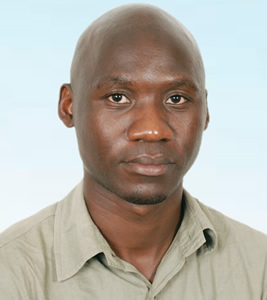Gerald Mboowa, PhD, BSc, MSC
 Mboowa PhD. is currently an Implementation Science Expert for Bioinformatics at the Africa Centers for Disease Control and Prevention (Africa CDC) under the Africa CDC Institute of Pathogen Genomics. His interests include utilizing genomics and bioinformatics approaches to understanding diverse pathogens, resistance and susceptibility patterns to common infectious diseases in Africa. For his PhD research, he interrogated Next-generation sequencing (NGS) sequence genomic data using bioinformatics tools to investigate and identify the pathogenicity of host functional genetic variants/loci in pediatric HIV/AIDS disease progression in two sub-Saharan Africa populations. This work was funded by THRiVE-2 (Training Health Researchers into Vocational Excellence in East Africa) and CAfGEN (Collaborative African Genomics Network).
Mboowa PhD. is currently an Implementation Science Expert for Bioinformatics at the Africa Centers for Disease Control and Prevention (Africa CDC) under the Africa CDC Institute of Pathogen Genomics. His interests include utilizing genomics and bioinformatics approaches to understanding diverse pathogens, resistance and susceptibility patterns to common infectious diseases in Africa. For his PhD research, he interrogated Next-generation sequencing (NGS) sequence genomic data using bioinformatics tools to investigate and identify the pathogenicity of host functional genetic variants/loci in pediatric HIV/AIDS disease progression in two sub-Saharan Africa populations. This work was funded by THRiVE-2 (Training Health Researchers into Vocational Excellence in East Africa) and CAfGEN (Collaborative African Genomics Network).
Furthermore, Mboowa has done postdoctoral research specifically examining HIV viral NGS data to understand its genomic diversity through the HIV Co-infections in Uganda Program funded by the Fogarty International Research Training Grant (Project #2D43TW009771-06) at the Infectious Diseases Institute, Makerere University. Currently, he is working on a project funded by the European and Developing Countries Clinical Trials Partnership (EDCTP) titled Pathogen Detection in HIV-infected Children with Non-malarial Febrile Illnesses using Metagenomic Sequencing (PHICAMS), TMA2020CDF-3159, NCT05085158.
Previously, he has done work on understanding the Transmission Dynamics of Antimicrobial Resistance at two National Referral Hospitals in East Africa using NGS and bioinformatic. This work was funded by the Grand Challenges Africa (GCA/AMR/rnd2/058/). Additionally, Mboowa has worked as a bioinformatics scientist at the African Centre of Excellence in Bioinformatics and Data-Intensive Sciences of Makerere University. Here he supported public health institutions to utilize bioinformatics applications for infectious disease outbreak investigations and surveillance of antimicrobial resistance in a wide range of pathogens. As a bioinformatician, he is interested in training and transitioning to the use of High-throughput sequencing (HTS) technologies and bioinformatics applications in public health. Mboowa holds a bachelor of science in biomedical technology and Master of Science in Immunology and Clinical Microbiology from Makerere University. He boasts over 30 papers in peer reviewed journals.
PhD Project – Functional host genetic loci associated with paediatric HIV/Aids disease progression in sub-Saharan Africa populations
In HIV infection, there are two groups of people- rapid AIDS progressors (develop AIDS in 3 years or less after infection, in absence of HIV treatment) and Long term non-progressors (take more than 10 years to develop AIDS after infection in absence of HIV treatment). HIV treatment is also called “Treat-For-Life” meaning that when someone tests HIV positive, he/she will be started on this kind of treatment for the rest of their life thereby exposing them to the drugs’ dangerous side effects including liver damage; a dangerous experience in children since their body organs/immune system are not well developed yet they have many years ahead of them to live and be productive than their adult counterparts. Therefore Gerald wants to come up with a test that uses genes (DNA) to identify a child who when HIV infected will take many years to develop AIDS without treatment such that they will not be exposed to these drugs’ effects. This will also help to prioritize HIV treatment to AIDS rapid progressors especially in our resource limited settings where HIV treatment coverage is still low.
PhD Supervisors/Mentors
- Prof. Moses Joloba, Makerere University College of Health Sciences, School of Biomedical Sciences
- Dr. Gkrania-Klotsas Effrossyni, MRC: Box 285, IMS, Addenbrooke’s Hospital, Hills Road, Cambridge
- Dr. Harriet Groom, Department of Medicine, Addenbrooke’s Hospital, Cambridge
THRiVE-2 Fellows

